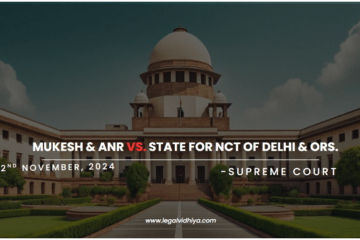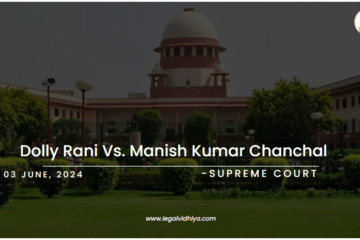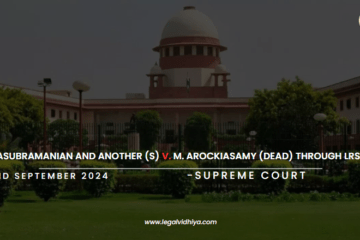
| CITATION | 2024 INSC 306 |
| DATE OF JUDGMENT | 16th March 2024 |
| COURT | Supreme Court of India |
| APPELLANT | Association of Engineers and others |
| RESPONDENT | State of Tamil Nadu and others |
| BENCH | B.R. Gavai, Sandeep Mehta |
INTRODUCTION
The case Association of Engineers vs. The State of Tamil Nadu revolves around a dispute regarding the appointment of Technical Assistants as Assistant Engineers in the Public Works Department (PWD) of the Government of Tamil Nadu. The appellants, represented by the Association of Engineers, challenge the legality of these appointments, on the grounds that they violate the recruitment and promotion rules in the Tamil Nadu Engineering Service. The respondents, representing the State of Tamil Nadu, defend these appointments, stating that they are in accordance with executive orders and are necessary for the administrative needs of the department. The case involves a series of legal battles raising fundamental questions regarding the interpretation of statutory rules, the validity of executive orders, and the principles of equality and efficiency in public administration.
FACTS OF THE CASE
- Government Order (GO) No. 1 allowed Junior Draughting Officers, Draughting Officers, Overseers, and Technical Assistants in the Public Works Department (PWD) of Tamil Nadu with 5 years of service and B.E./A.M.I.E. qualification to become Assistant Engineers through service transfer.
- This order was clarified with G.O. No. 88, which exempted the need for consultation with the Tamil Nadu Public Service Commission (TNPSC) for such appointments.
- A writ petition was filed before the Madras High Court by Engineering Graduates, challenging the legality of G.O. No. 1 on the grounds that part-time B.E. degrees were inferior to regular ones. However, the High Court dismissed the petition.
- Later, an advertisement was issued by the Tamil Nadu Public Service Commission (TNPSC) for direct recruitment of Assistant Engineers. This advertisement was challenged by several Junior Draughting Officers, Draughting Officers, and Technical Assistants before the Tamil Nadu Administrative Tribunal, arguing that their appointments should also be considered.
- The Tribunal allowed the applications of Junior Draughting Officers and Draughting Officers but dismissed those of Technical Assistants, stating that they were not part of the feeder category for recruitment by transfer to the post of Assistant Engineers.
- The Association of Engineers filed a writ petition before the Madras High Court, challenging the Tribunal’s decision. However, the High Court upheld the Tribunal’s decision.
- Due to a shortage of eligible candidates to fill vacancies for Assistant Engineers, the State Government issued directions to appoint Technical Assistants with B.Ε./Α.Μ.Ι.Ε. qualifications and five years of service on a temporary basis.
- This led to another writ petition by the Association of Engineers, challenging the appointment of Technical Assistants as Assistant Engineers arguing they violated previous tribunal and court orders and statutory rules.
- The Madras High Court restrained the government from making such appointments unless the statutory rules were amended to include Technical Assistants as a feeder category.
- However, the Division Bench of the Madras High Court quashed the order and upheld the appointment of Technical Assistants as Assistant Engineers.
- The present set of appeals was filed before the Supreme Court of India, challenging the judgment of the Division Bench of the Madras High Court.
ISSUES RAISED
- Whether the appointment of Technical Assistants as Assistant Engineers is in accordance with the established rules and statutory provisions?
- Whether these appointments violate the rights of other eligible candidates and undermine the merit-based recruitment process.
- Whether the temporary appointments of Technical Assistants were irregular and requires regularization.
- Whether the absence of rule amendments makes the appointments invalid.
CONTENTIONS OF APPEALENT
- The Appellant’s Counsel claims that appointing Technical Assistants as Assistant Engineers is illegal and violates statutory rules.
- They argue that the criteria for appointment, particularly the requisite qualifications and procedures outlined in the Tamil Nadu State and Subordinate Services Rules, were not duly followed.
- These appointments, allegedly made through executive orders, bypass the established recruitment process and unfairly promote individuals through a “backdoor” entry.
- Furthermore, they contend that these appointments are against the principles of equality under Article 14 of the Constitution, as they create an unfair advantage for some candidates and efficiency in public administration under Article 335.
- The appellants emphasize the need for amending rules before making such appointments and cite various legal precedents in support of their arguments.
- Moreover, the Technical Assistants’ temporary appointments have not been regularized, nor has their probation commenced.
CONTENTIONS OF REPONDENT
- The respondent’s counsel justifies the appointments of Technical Assistants as Assistant Engineers, citing the authority of executive orders and adherence to established rules and regulations.
- They argue that these appointments are necessary to address staffing shortages within the department, particularly in filling vacancies that remained unfilled through the regular recruitment process.
- They point to past legal precedents and government orders that have upheld the validity of appointing Technical Assistants as Assistant Engineers, thus defending the legality of the appointments.
- They clarify that while Technical Assistants’ appointments were initially temporary, efforts are underway to regularize them, ensuring compliance with procedural requirements and administrative protocols.
JUDGEMENT
The Supreme Court, after carefully considering arguments from both sides and thoroughly examining the legal and factual aspects of the case, dismisses the appeals challenging the appointments of Technical Assistants as Assistant Engineers. The Court finds these appointments in line with government orders, past court decisions, and executive instructions, thus confirming their legality. Upholding the High Court’s decision, the Court allows the continuation of Technical Assistants’ appointments as Assistant Engineers and sends related matters for further consideration. In its decision, the Court recognizes the complexities present in the dispute and stresses the importance of fair employment practices. Additionally, it emphasizes the government’s authority in effectively managing staffing challenges. By upholding the appointments, the Court reaffirms their legality within the existing legal framework while maintaining consistency in administrative decisions and respecting the government’s authority in hiring and promotion matters.
ANALYSIS
The case revolves around the appointments of Technical Assistants to Assistant Engineers within Tamil Nadu’s Public Works Department (PWD). The Madras High Court approved Government Order (G.O.) No. 1, which the Supreme Court later upheld after being challenged. Technical Assistants have a separate 25% quota for promotions, while the remaining 75% is for direct recruits. The government supported regularizing their services through both an official order and an affidavit. Moreover, due to an insufficiency of eligible candidates, Technical Assistants were temporarily appointed as Assistant Engineers. This decision highlights the urgent need to efficiently fill vacancies within the department.
However, amidst these proceedings, the appellant association sought to assert control over all available positions, including those designated for candidates promoted from subordinate services. The court deemed this action unjust, emphasizing the importance of maintaining fairness and equity in the promotion process. Ultimately, the court rejected the appeal, citing the discretionary nature of judicial intervention under Article 136 of the Constitution and affirming the established fairness and equity within the PWD’s promotion framework in Tamil Nadu.
CONCLUSION
In this case, the Supreme Court has made a significant decision regarding the appointments of Technical Assistants as Assistant Engineers within the Public Works Department of Tamil Nadu. The decision reaffirms the legality of these appointments. Through a meticulous analysis of various government orders, historical judgments, and administrative practices, the Court concluded that these appointments followed established procedures and were legally valid. By upholding the government’s authority to effectively handle staffing issues in the Public Works Department, the decision emphasizes the importance of maintaining a careful balance between following regulatory rules and meeting the practical needs of public service. The decision also underscores the significance of fair employment practices and the challenges of dealing with complex administrative rules and regulations. This landmark ruling not only clarifies the legal aspects related to staffing decisions in the Public Works Departments but also emphasizes the importance of maintaining fairness and efficiency in recruitment and promotion processes within the public sector.
REFERENCES
- SCC Online
- https://indiankanoon.org/doc/18291089/
This Article is written by Ananya Saren student of Surendranath Law College, University of Calcutta; Intern at Legal Vidhiya.
Disclaimer: The materials provided herein are intended solely for informational purposes. Accessing or using the site or the materials does not establish an attorney-client relationship. The information presented on this site is not to be construed as legal or professional advice, and it should not be relied upon for such purposes or used as a substitute for advice from a licensed attorney in your state. Additionally, the viewpoint presented by the author is of a personal nature.




0 Comments